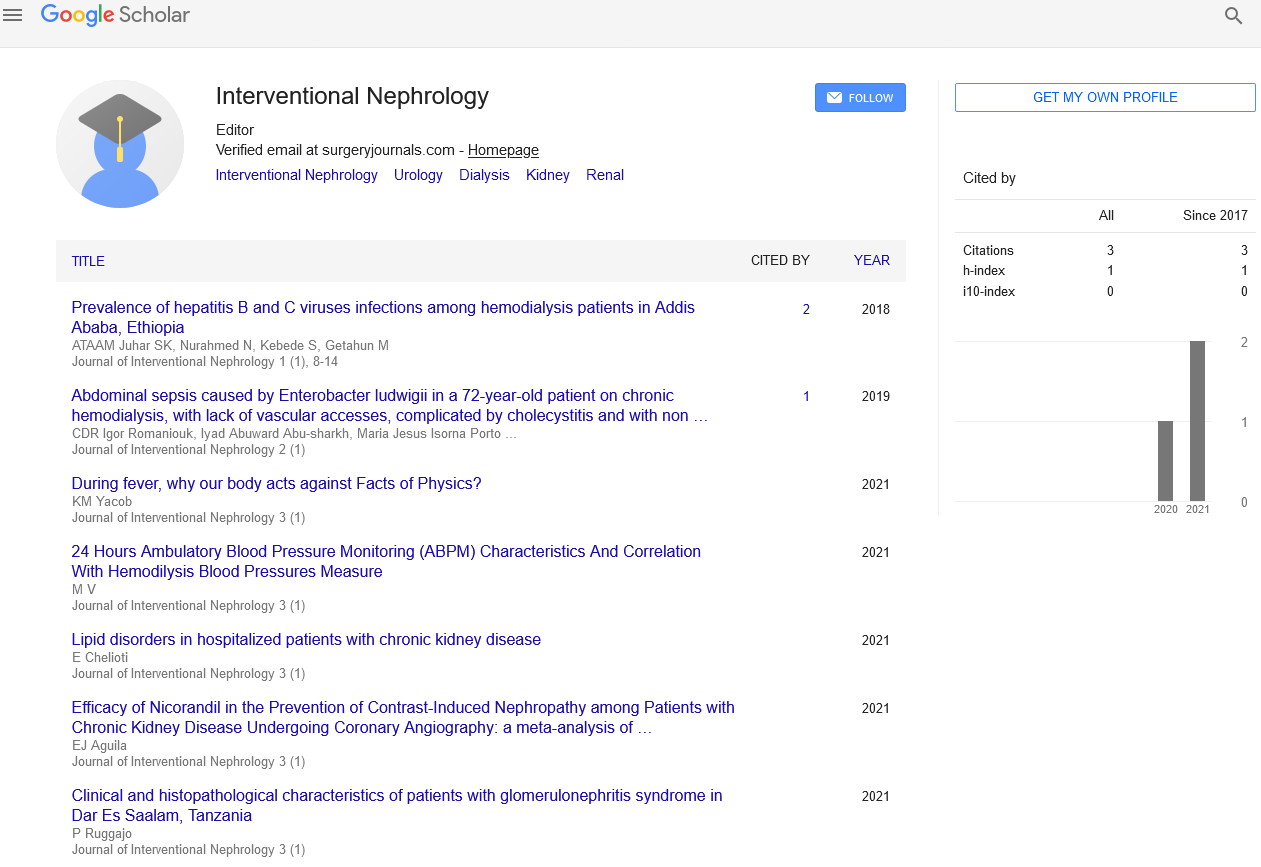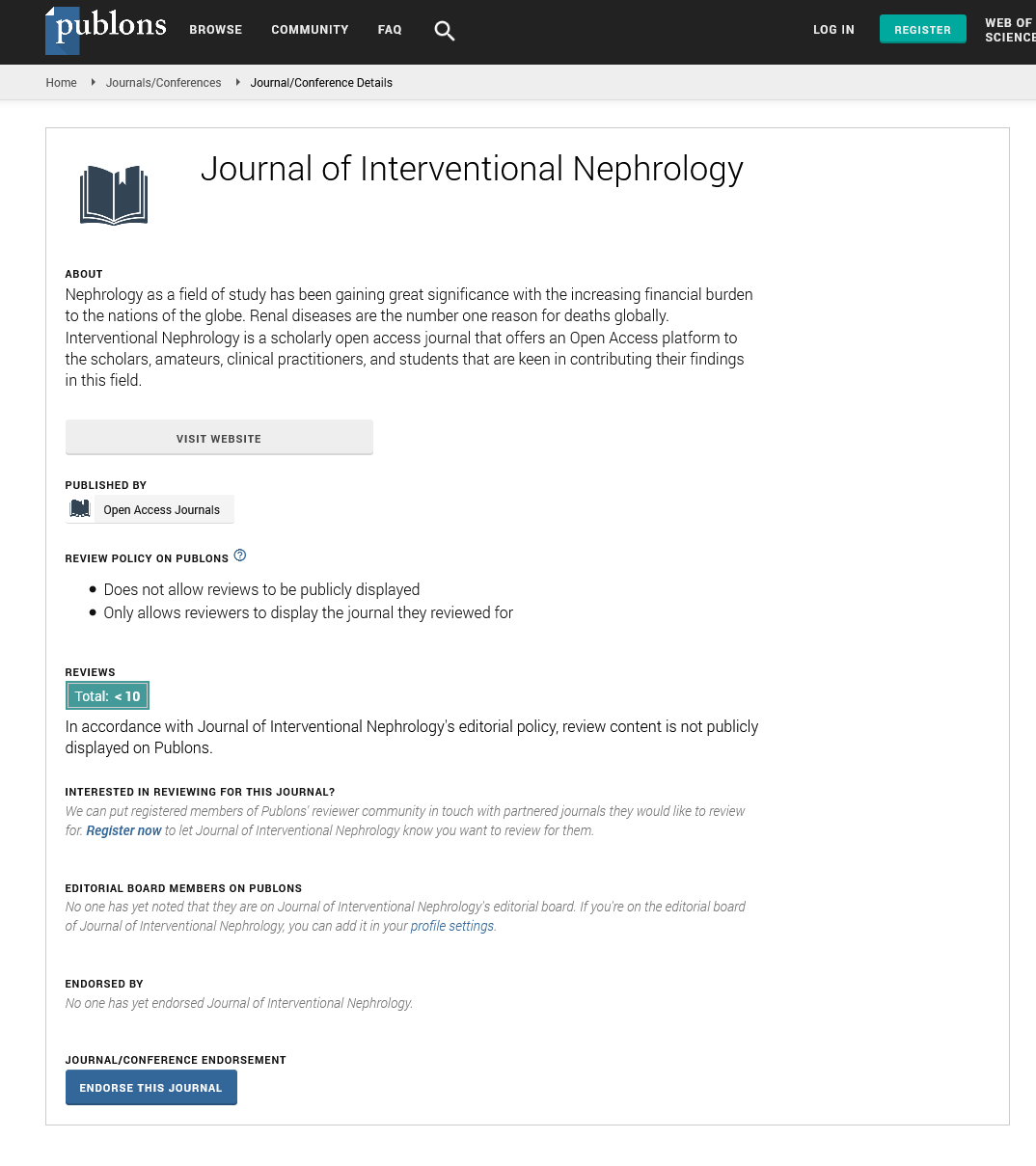Perspective - Journal of Interventional Nephrology (2024) Volume 7, Issue 3
Embracing Life with a Solitary Kidney: Understanding, Care, and Living Well
- Corresponding Author:
- Liming Flaker
Department of Medicine,
University of New Haven,
Turkey
E-mail: LimingF0908@edu.dessn
Received: 20-May-2024, Manuscript No. OAIN-24-136471; Editor assigned: 22-May-2024, PreQC No. OAIN-24-136471 (PQ); Reviewed: 05-Jun-2024, QC No. OAIN-24-136471; Revised: 12-Jun-2024, Manuscript No. OAIN-24-136471 (R); Published: 21-Jun-2024, DOI: 10.47532/ oain.2024.7(3).276-277
Introduction
A solitary kidney, a condition where an individual is born with or loses one kidney due to disease, surgery, or donation, presents unique challenges and considerations for health and well-being. While living with a solitary kidney may raise concerns about kidney function and overall health, many individuals lead fulfilling lives with proper management and care. In this comprehensive guide, we explore the intricacies of solitary kidney, including its causes, implications, lifestyle considerations, and strategies for optimal health.
Description
Understanding solitary kidney
A solitary kidney may result from congenital anomalies, such as renal agenesis or dysplasia, surgical removal (nephrectomy) due to conditions like kidney cancer or trauma, or kidney donation for transplantation. Regardless of the cause, having only one functioning kidney requires attention to kidney function and overall health to mitigate the risk of complications.
Implications of living with a solitary kidney
While most individuals with a solitary kidney lead normal lives without significant health issues, there are potential implications to consider:
• Compensatory hypertrophy: The
remaining kidney often undergoes
compensatory hypertrophy to compensate
for the loss of its counterpart. While this
adaptation typically maintains normal
kidney function, it may increase the risk of
complications in certain situations, such
as kidney injury or high blood pressure.
• Reduced renal reserve: Individuals with
a solitary kidney have reduced renal reserve, meaning they may be more
susceptible to kidney injury from factors
such as dehydration, certain medications,
or medical conditions that affect kidney
function.
Risk of chronic kidney disease: While
most individuals with a solitary kidney
maintain normal kidney function, there
is a slightly increased risk of developing
Chronic Kidney Disease (CKD) later in
life, particularly if additional risk factors
such as diabetes, hypertension, or obesity
are present.
• Pregnancy considerations: Pregnancy can
place additional strain on kidney function
due to increased blood volume and
metabolic demands. While most women
with a solitary kidney have uncomplicated
pregnancies, close monitoring by
healthcare providers is essential to ensure
optimal maternal and fetal outcomes.
Lifestyle considerations and management strategies
Living well with a solitary kidney involves adopting healthy lifestyle habits and proactive management strategies:
• Maintain a healthy diet: A balanced diet
rich in fruits, vegetables, whole grains,
and lean proteins supports overall health
and kidney function. Limiting salt,
sugar, processed foods, and excessive
protein intake can help reduce the risk of
hypertension and kidney disease.
• Stay hydrated: Adequate hydration is
essential for kidney health. Drinking
plenty of water throughout the day
helps maintain kidney function and
prevent dehydration, which can strain the
remaining kidney. Manage blood pressure: Monitoring blood
pressure regularly and maintaining blood
pressure within a healthy range (typically
<120/80 mmHg) is crucial for protecting
kidney function and cardiovascular health.
Lifestyle modifications, such as regular
exercise, stress management, and medication
if necessary, can help manage blood pressure
effectively.
• Avoid nephrotoxic substances: Certain
medications, such as Nonsteroidal Antiinflammatory
Drugs (NSAIDs), certain
antibiotics, and contrast agents used in
imaging procedures, can be nephrotoxic
and potentially harmful to kidney function.
Always consult with healthcare providers
before taking medications or undergoing
medical procedures.
• Regular exercise: Engaging in regular
physical activity promotes overall health,
cardiovascular fitness, and weight
management. Aim for at least 150 minutes
of moderate-intensity aerobic activity or
75 minutes of vigorous-intensity activity
per week, along with muscle-strengthening
exercises on two or more days per week.
• Monitor kidney function: Regular monitoring of kidney function through
blood tests (e.g., serum creatinine, estimated
glomerular filtration rate) and urine tests
(e.g., urine protein, albumin-to-creatinine
ratio) allows for early detection of kidney
dysfunction and timely intervention if
needed.
• Avoid smoking and limit alcohol intake: Smoking and excessive alcohol consumption
can increase the risk of kidney disease and
other health problems. Quitting smoking
and limiting alcohol intake support overall
health and reduce the risk of kidney-related
complications.
Conclusion
Living with a solitary kidney requires proactive management, healthy lifestyle choices, and regular monitoring to maintain optimal kidney function and overall health. By understanding the implications of having a solitary kidney and adopting strategies for healthy living, individuals can embrace life with confidence and thrive. Close collaboration with healthcare providers, adherence to medical recommendations, and ongoing self-care are essential for maximizing quality of life and well-being with a solitary kidney.


